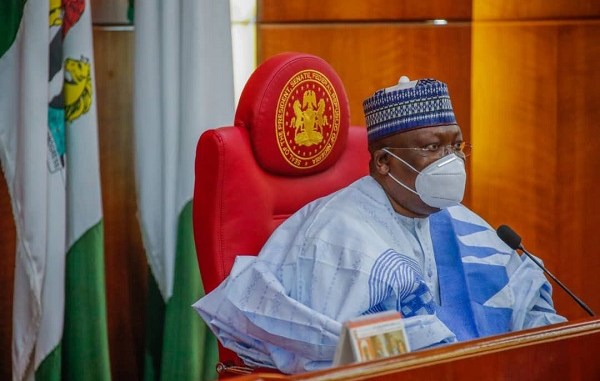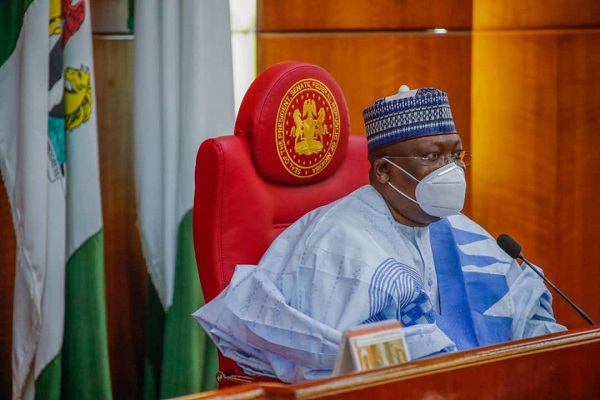
President of the Senate Ahmad Lawan has lamented that the National Assembly is incapacitated in the fight against corruption and waste of public resources because the 1999 Constitution did not give the parliament the needed legislative power to do so.
He said this Monday while responding to a lecture delivered by a former Speaker House of Representatives Dimeji Bankole at the 6th convocation ceremony of the National Institute for Legislative and Democratic Studies – University of Benin (NILDS-UNIBEN) held at the National Assembly Abuja.
Bankole’s lecture was on “Challenges of Legislative Turnover: Implications for Good Governance in Nigeria.”
Lawan said though Section 88 of the 1999 Constitution (as amended) provides that the parliament shall expose corruption, embezzlement and wastes, it did not equip the parliament with the power of sanctions.
He said: “I think the reality is that the Constitution of the Federal Republic of Nigeria (1999 as amended) as it is today has left the legislature constrained because, in Section 88, it talks of the legislature exposing corruption, wastes and embezzlement and stops there. So, when you expose something and you can’t do anything, how does that solve the problem? It’s like seeing a thief and you say “thief, thief! thief! ole! ole! and you can’t act as a police person to arrest this person and cannot try or prosecute this person and the person goes.
“So, the legislature is really incapacitated; that is the fact because, you can’t do anything. If you sign a warrant of arrest for someone you invited and who refused to appear before the National Assembly; you have no police of your own in the National Assembly to send to go and arrest that person. You have to go through the Inspector General of Police and where does he belong?
“And the IGP will have the choice if you ask him to send the police to arrest somebody let’s say in the Ministry of Justice; he will really has to weigh the options whether he will create problem for himself or the institution by issuing that warrant.”
Lawal, who bemoaned the high turnover of legislatures at the National Assembly, said this was occasioned by politics of who determines who gets what, saying this would negatively impact the nation’s democracy.
“The National Assembly in particular and legislature as an institution , has never been favoured in the political evolution of Nigeria. Turnover is a big issue of development of democracy in Nigeria.
“Required constitutional powers to effectively carry out its functions and duties , are not there just as required fund to function optimally as far as oversights are concerned, making the legislators to be endangered species at all levels.
“Over the years , while the budget of the National Assembly which is less than one percent of the national budget , attracts attention of Nigerians , the remaining 99% belonging to the executive and Judiciary, is less talked about,” Lawan further added.
Bankole
In his paper, former Speaker Bankole said those elected into parliament should not simply be “loyalists of governors” or governors.’
Rather, he said, they should be people who can understand and engage with policy and other technical issues routinely presented to the legislature.
The former lawmaker further said non-executive interference can protect legislative terms and results in long-term institutions and capacity building.
Bankole also noted that when power is concentrated in one arm of government, it could result in tyranny and ultimately hinder the effectiveness of other arms from holding each other to account.
According to him, while at the National Assembly since 2003 till now, over 70% of lawmakers always failed to win election back into the Senate or the House of Representatives, over 80% of such turnovers happened at the State and local government levels.
The turnovers, he added, not only get the legislators at all levels incapacitated, but weakens legislature as an institution.
“Incapacitation of legislature in Nigeria through high turnover of legislators, four , four years interval and inadequate funding coupled with deficiencies of enabling laws , have made our practice of democracy to be less development – driven.
“Weak legislature with high turnover of inexperienced legislators will continue to hamper good governance in Nigeria,” he said.
Earlier, Director General NILDS Prof Abubakar O. Sulaiman said the convocation ceremony was held for a total of 87 candidates certified in both character and learning by the authorities of NILDS and University of Benin.
The graduands include 30 candidates for Master’s Degree in Legislative Studies; eight candidates for Masters Degree in Legislative Drafting; 19 candidates for Master’s Degree in Parliamentary Administration; 13 candidates for Master’s Degree in Elections and Party Politics and 11 candidates in PGD in Political Party Management while the Higher National Diploma (HND) in official reporting has 6 candidates.
